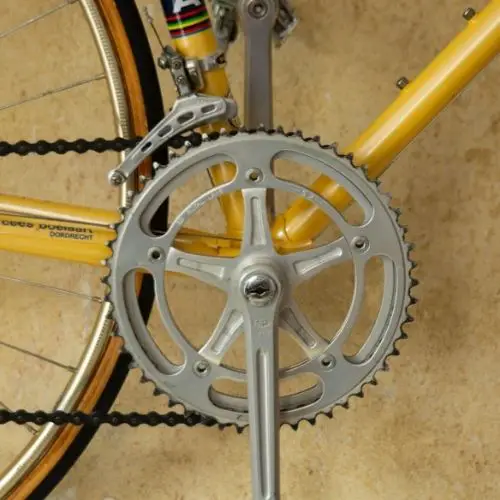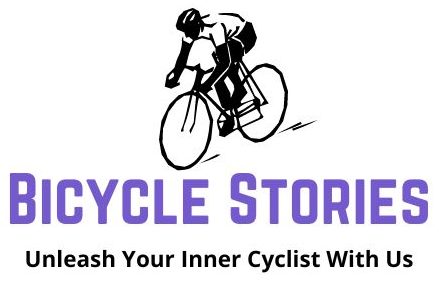The clicking sound heard when coasting on a road bike is caused by the drivetrain, which consists of the chain, cassette, and crankset. When coasting, these pieces are still spinning due to momentum. The clicks come from the connection between the components as they move over each other – as one piece moves forward, it bumps into another piece causing an audible click.
This issue can be fixed with proper maintenance including regularly adjusting your derailleur and replacing worn parts such as chains or cassettes. Additionally lubing all moving parts helps reduce friction and create smoother transitions that minimize clicking sounds while coasting on your road bike.
Road bikes click when coasting because the chain is traveling over the drivetrain components, such as the cassette and chainrings. This noise occurs because of friction between the moving parts, which causes them to vibrate against one another. While it can be annoying at times, this clicking sound is a sign that your bike’s drivetrain is properly lubricated and working correctly – so don’t worry too much about it!

Credit: bikesfaq.com
What Causes the Clicking Sound When Coasting on a Bike?
When coasting on a bike, you may sometimes hear a clicking sound coming from the drivetrain. This is usually caused by the chain not being tightened properly or due to wear and tear of the chain itself. If the chain slack is too great, it will allow components in the drivetrain to shift slightly and cause a clicking noise as they move back into alignment.
Another possible cause could be worn out parts such as cassettes, chains rings or derailleur pulleys which can create excessive play in the system resulting in an annoying click every time you pedal. To fix this issue, make sure your chain is tight enough so that there’s no slack between links when pedaling and check for any damaged components like bent teeth on your front and rear sprockets or worn-out pulleys on your derailleur. Also ensure that all bolts are correctly tightened throughout your bike’s drivetrain for optimal performance with minimal noise production.
Should a Bike Click When Coasting?
Bicycles are a great form of transport, providing people with an affordable and environmentally friendly way to move around. But one aspect that many cyclists struggle with is the issue of whether or not their bike should click when coasting. This is a question that has divided opinion in the cycling community for some time, but it’s important to understand both sides before coming to any conclusions.
On one hand, having your bike suddenly start clicking while you’re coasting can be annoying and disruptive. It also makes it hard for cyclists to concentrate on other aspects of their ride such as terrain or traffic conditions. On the other hand, having your bike make this sound can act as a useful reminder that you need to switch gears or stop pedalling if you want to maintain maximum efficiency on your ride.
Ultimately, there is no definitive answer when it comes to whether or not bikes should click when coasting; it largely depends on personal preference and what feels comfortable for each individual cyclist.
Why Do Bikes Click When Not Pedaling?
Bicycles often make a clicking sound when they are not being pedaled. This is usually caused by the chain moving and contacting the teeth on the cogs of your derailleur. When you pedal, it forces the chain to move in a forward motion and it remains tight against the cogs.
But when you stop pedaling, gravity takes over and causes the chain to relax back down onto its original path which makes contact with each cog as it goes. The resulting noise is what we hear as a click or rattling sound coming from our bike’s drivetrain. This clicking can also be caused by dirt or debris that has collected between links of your chain, causing them to stick together as they move along each tooth of the cogs – creating an intermittent clacking sound as they try to break free from one another again.
Additionally, if your derailleur is out of alignment this could cause excess friction in certain areas leading to increased noise levels while coasting or even shifting gears incorrectly due to misalignment issues. Fortunately, these types of noises can be easily solved with regular maintenance such as cleaning and lubricating your drivetrain components (chain, cassette/freewheel etc) regularly; making sure all cable tensioners are tightened properly; adjusting derailleur limit screws for proper shifting range; checking for any bent parts that may need replacing; and inspecting for any worn-out bearings which should be replaced immediately before further damage occurs!
What is the Clicking Noise When Freewheeling?
When freewheeling, the clicking noise that you hear is created by the ratchet mechanism within the hub of your bike. This ratchet allows for a free-wheeling action when pedaling isn’t occurring and allows your wheels to continue spinning without any resistance from the pedals. The sound occurs when one of these teeth engages with another as they rotate around each other while in motion.
This clicking noise can be heard every few revolutions depending on how many teeth are engaging and releasing at any given time. It’s important to note that this sound should never be ignored and instead checked out by an experienced bicycle mechanic if it persists or becomes too loud. Additionally, regular maintenance will help ensure smooth operation and reduce wear on components over time, keeping your bike running like new!
Why does my bike make a clicking sound when I am not pedaling?
Bike Making Clicking Noise When Not Pedaling
Possibly one of the most common problems cyclists experience is their bike making clicking noises when not pedaling. This noise usually originates from either a worn chain or loose crank arm bolts, but it could also be caused by something as simple as a loose pedal or derailleur cable. If your bike is making clicking noises when you’re not pedaling, make sure to take it into a professional bike shop for further inspection and repair.
Bike Clicking Noise
Bike clicking noises are commonly heard when riding a bike, and is usually caused by the chain slipping on the gears. This can be fixed by adjusting the derailleur, which is a system of pivoted levers that change gear ratios. Other causes may include worn out bearings, loose or rusted components, or improper maintenance.
In any case, it’s important to pay attention to these sounds as they can indicate potential problems with your bike or components that need repair or replacement.
Bike Crank Clicks Once Per Revolution
The bike crank click is an important part of every cyclist’s ride. It emits a clicking sound that occurs once per revolution to indicate the rotation of the crankset and provide feedback on pedaling cadence. Knowing when your crank clicks can be useful for making sure you are pushing at the appropriate speed, so it’s important to take notice!
Road Bike Rear Hub Noise
Riding a road bike can be an enjoyable experience, but it’s important to keep your bike in good condition. If you notice that there is a rattling or clicking noise coming from the rear hub of your road bike, this could be a sign that something is wrong and needs attention. In some cases, this noise might just be the result of debris caught between the cassette and freehub body, which can easily be removed with a brush or rag.
However, if the sound persists after cleaning, then it may indicate more serious problems such as worn bearings or loose components that need to be replaced by an experienced mechanic. Regular maintenance will ensure that your road bike operates at peak performance for many miles down the road!
Electric Bike Making Clicking Noise
If you recently purchased an electric bike and you’re hearing a clicking noise when pedalling, it could indicate that something is wrong with the chain. You should check to make sure that the chain is properly lubricated, as this can be the cause of a clicking sound. If there is no visible sign of damage or wear on the chain, try cleaning and re-oiling it before taking your bike in for repairs.
Noisy Cassette Bike
The Noisy Cassette Bike is a new type of bicycle that uses cassette technology to create an extra loud sound when pedaling. This bike has been designed with the purpose of being noticed and seen, making it perfect for those who ride in busy urban areas. The audio output from the cassette can reach up to 110dB, which means it’s much louder than most other bikes on the market.
With its bold design and signature sound, the Noisy Cassette Bike definitely stands out from the crowd!
Bike Freewheel
A bike freewheel is a device that allows the rider to coast without having to pedal. The freewheel is made up of several small gears and springs that are designed to disengage when the rider stops pedaling, allowing them to coast without resistance from the drivetrain. A good quality bike freewheel will provide smooth, reliable shifting and allow for efficient use of energy while riding.
Bottom Bracket Clicking When Pedaling Hard
When pedaling hard, it is not uncommon for your bike to make a clicking sound from the bottom bracket. This can be caused by loose or worn out parts in the bottom bracket, such as bearings and spacers. To fix this issue, you’ll need to take apart your bottom bracket and check all of its components for wear and tear.
If any part needs replacing, replace it with a new one specifically designed for your bike model. Proper lubrication also helps reduce the amount of friction between these moving pieces, so make sure that everything is well-oiled before putting them back together again!
Conclusion
Road bikes have been designed to click when coasting in order to alert the rider of a potential mechanical issue with their bike. This clicking noise can indicate that the chain is not properly lubricated or aligned, or that something else is amiss with the bike’s components. By being aware of this clicking sound, riders can take preventative measures and ensure their bikes are running smoothly and efficiently.
With proper maintenance and attention paid to this warning noise, road bikers will be able to enjoy safe rides free from any unexpected issues.
